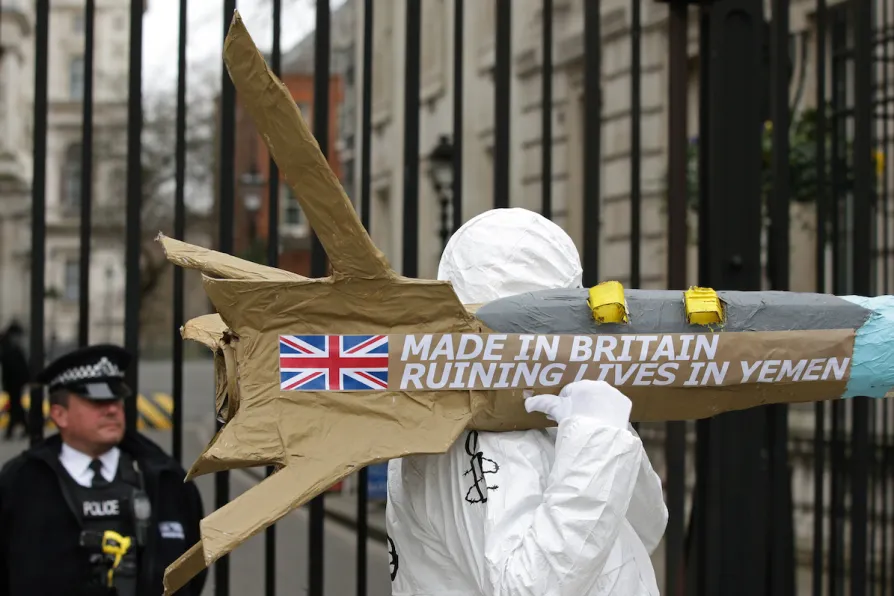
 Amnesty International protest outside Downing Street
Amnesty International protest outside Downing Street
A NEW analysis released today has revealed troubling parallels between British arms exports and explosive attacks in civilian areas.
Between 2021 and 2024, Britain exported arms to 84 countries under a licensing regime designed to safeguard against misuse.
Action on Armed Violence (AOAV) identified that in 23 of these countries, there were 6,338 incidents carried out by state militaries involving explosive weapons in populated areas.
These attacks caused 30,528 civilian deaths and 29,162 injuries, according to its analysis of English-language media reports.
While AOAV acknowledges that it is unclear if British weapons were used in the attacks, the figures raise questions about the government’s commitment to international law.
Under the Arms Trade Treaty and British regulations, export licences must be denied if there’s a “clear risk” that the weapons could be used to commit serious violations of international human rights or humanitarian law.
Saudi Arabia, identified in the report as Britain’s largest arms customer, purchased £4.5 billion worth of weapons between 2021 and 2024.
In that same period, AOAV documented over 300 incidents of explosive violence linked to operations in Yemen — which killed 717 people, and injured 1,134 more.
Israel received £85 million worth of arms in the same four-year period, during which time it waged its genocidal campaign in Gaza.
AOAV recorded 24,124 state-inflicted deaths by explosives, though it notes the true figure is likely higher.
Turkey purchased £832m worth of arms and military equipment from Britain from 2021 to 2024.
During this time, it launched multiple cross-border operations in Syria and northern Iraq, targeting Kurdish groups. AOAV recorded 462 civilian deaths and 908 injuries during this time.
The report notes that several countries have taken steps to align arms trade decisions with international humanitarian law.
In April, Spain cancelled a contract to buy bullets from Israeli arms firm IMI Systems under political pressure amid the genocide in Gaza.
Germany, Norway, and the Netherlands have imposed restrictions on arms exports to countries such as Saudi Arabia, the UAE and Egypt in response to concerns over human rights abuses and war crimes.
Responding to the report, a government spokesperson said: “The UK operates one of the most robust export control regimes in the world and we rigorously assess every licence application on a case-by-case basis in line with our responsibilities under domestic and international law.
“We never approve the export of equipment if doing so would be inconsistent with our Strategic Export Licensing Criteria and we are able to suspend, refuse or revoke licences if circumstances change.”

ANSELM ELDERGILL draws attention to a legal case on Tuesday in which a human rights group is challenging the government’s decision to allow the sale of weapons used against Palestinians

Keir Starmer’s £120 million to Sudan cannot cover the government’s complicity in the RSF genocide or atone for the long shadow of British colonialism and imperialism, writes CLAUDIA WEBBE












